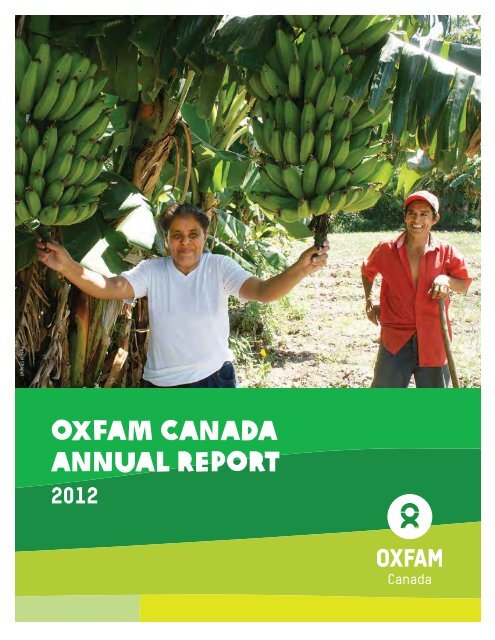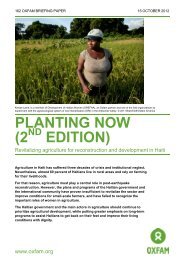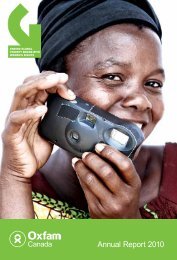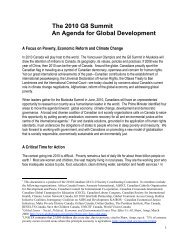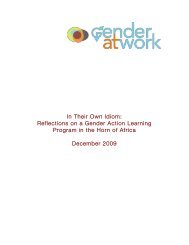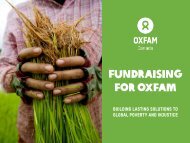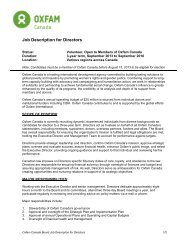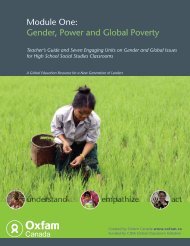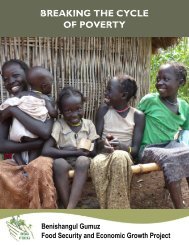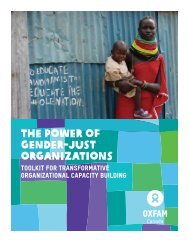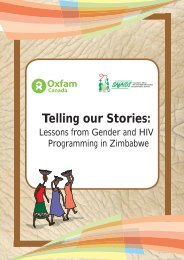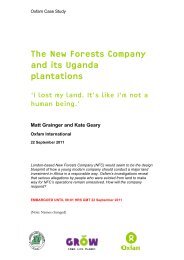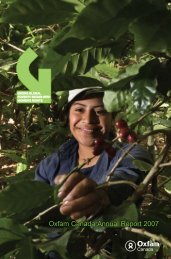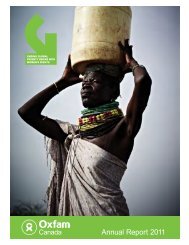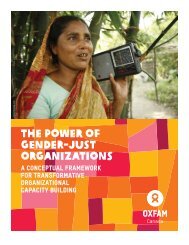Annual Report 2012 - Oxfam Canada
Annual Report 2012 - Oxfam Canada
Annual Report 2012 - Oxfam Canada
Create successful ePaper yourself
Turn your PDF publications into a flip-book with our unique Google optimized e-Paper software.
Pascal Chaput<br />
<strong>Oxfam</strong> CANADA<br />
ANNUAL REport<br />
<strong>2012</strong>
Our year<br />
Message from the Chair of the Board<br />
and the Executive Director<br />
A positive future now – free from poverty and injustice.<br />
That’s how we at <strong>Oxfam</strong> sum up our vision and our challenge.<br />
We live in a world of tumult where growing inequality,<br />
spiking food prices and increasingly violent weather are<br />
undermining gains for many – in particular women and girls.<br />
But we also see growing numbers of citizens taking action to<br />
defend their rights and improve their lives.<br />
Among <strong>Oxfam</strong>’s partners are courageous and creative women<br />
and men, many very young, who are confronting this stark<br />
reality and building a better world. They reject the status quo<br />
and challenge complacency in the face of so much wealth<br />
and such dire poverty.<br />
They call on governments and elites in the North and the<br />
South to account for the gap between their rhetoric and<br />
reality, where those who did the least to create the economic<br />
and climate crises are the ones affected first and most. And<br />
they are organizing communities to pool assets and share<br />
risks so they can be more self-sufficient and resilient.<br />
Among <strong>Oxfam</strong> supporters in <strong>Canada</strong> we are proud to say there<br />
are many active global citizens who share this passion and<br />
reflect this same commitment to social justice in their dayto-day<br />
lives. Through their contributions of time and money,<br />
as leaders in their communities and on their campuses, as<br />
fundraisers and educators, as e-activists and world-aware<br />
consumers, they model the future we are working together<br />
to build today, a future in which everyone can exercise their<br />
rights and pursue their dreams, free from threats, violence<br />
and suffering.<br />
<strong>Oxfam</strong> itself is not immune to political and economic crises.<br />
While we continue to grow our program and our support to<br />
partners, we have been forced to reduce our staff and our<br />
presence in some communities across <strong>Canada</strong>.<br />
This process of change has been painful at times but it has<br />
made us look carefully at what we do and how we can do<br />
it differently to increase our impact and our influence and<br />
make the best possible use of our precious resources. We<br />
believe that in this process of reinventing ourselves, we have<br />
increased our sustainability and resilience – important goals<br />
in turbulent times.<br />
Your continued support for our efforts and those of our<br />
partners is greatly appreciated – and absolutely essential to<br />
our success. Thank you.<br />
Margaret Hancock<br />
Chair<br />
Robert Fox<br />
Executive Director<br />
<strong>Oxfam</strong> <strong>Canada</strong> offices<br />
National Office<br />
39 McArthur Avenue, Ottawa, ON, K1L 8L7<br />
Tel: (613) 237-5236 Email: info@oxfam.ca<br />
National Fundraising Office<br />
210 - 410 Adelaide Street West, Toronto, ON, M5V 1S8<br />
Tel: (416) 535-2335/1-800-466-9326<br />
Email: donor_relations@oxfam.ca<br />
<strong>Oxfam</strong> BC Regional Office<br />
201 – 343 Railway Street, Vancouver BC, V6A 1A4<br />
tel. (604) 736-7678<br />
Prairies Regional Office<br />
Suite 200 416 21st Street East, Saskatoon, SK, S7K 0C2<br />
Phone: (306) 242.4097<br />
Atlantic Regional Office<br />
382 Duckworth Street, St. John’s, NL, A1C 1H8<br />
Tel: (709) 753-2202<br />
Charitable Registration # 12971 6866 RR0001<br />
www.oxfam.ca<br />
Board of Directors <strong>2012</strong><br />
Margaret Hancock (Toronto) Chair – Executive Director, Family Service<br />
Association of Toronto; Blair Redlin (Vancouver) Vice Chair – Public<br />
Service Administrator (retired); Don MacMillan (Ottawa) Treasurer –<br />
Professor of Accounting (retired); Yvonne Stanford (Calgary) Secretary –<br />
Consultant and Women’s Rights Advocate; Hannah Bontogon (Toronto)<br />
– Community Engagement Worker, New Heights Community Health<br />
Centres; Elizabeth Church (Halifax) – Vice President (Academic), Mount<br />
Saint Vincent University; Anastasia Gaisenok (Vancouver) – Special<br />
Project Coordinator, Justice Education Society; Fraser Green (Ottawa) –<br />
Principal and Chief Strategist at Good Works; John Greene (St. John’s)<br />
– Founding Executive Member of the Food Security Network; Kent<br />
Macaulay (Saskatoon) – Adult Educator and Consultant; Raïmi B. Osseni<br />
(Gatineau) – Independent Consultant, Community and International<br />
Development; Anna Smith (Toronto) Venture Leader, Education and<br />
Leadership - Engineers Without Borders <strong>Canada</strong>; Nidhi Tandon (Toronto)<br />
– Independent Consultant; Marty Venalainen (Toronto) – Lawyer,<br />
Associate, McMillan LLP; Lucie Goulet (Ottawa) Staff Representative, Ex<br />
Officio; Robert Fox (Ottawa) Executive Director, Ex Officio<br />
Meyer Brownstone (Toronto) Chair Emeritus<br />
<strong>Oxfam</strong> CANADA 2 ANNUAL REPORT <strong>2012</strong>
<strong>Oxfam</strong> <strong>Canada</strong><br />
in action<br />
Nick Danziger/<strong>Oxfam</strong><br />
We live in a rich world. Yet more than a billion people<br />
live in poverty, and the gap between rich and poor is<br />
widening. Charity as we’ve known it is not enough.<br />
<strong>Oxfam</strong> can see a better way. We’re a global movement<br />
for change – a network that empowers individuals,<br />
communities and organizations to build a future free<br />
from the injustice of poverty where the rights of women<br />
and girls are promoted and respected.<br />
• We want justice in the world<br />
• We speak out for systemic change<br />
• We make things happen here and now<br />
In <strong>2012</strong>, <strong>Oxfam</strong> <strong>Canada</strong>’s work reached more than 6<br />
million people in 22 countries. Our work was made<br />
possible through the support of more than 50,000<br />
donors, 33,000 campaigners and over 8,000 members<br />
across <strong>Canada</strong>.<br />
Here are a few examples of <strong>Oxfam</strong> <strong>Canada</strong> in action.<br />
42 per cent of girls interviewed by <strong>Oxfam</strong> for the report<br />
High Stakes: Girls’ Education in Afghanistan said their<br />
school did not have a building. Girls are regularly taught<br />
in tents, temporary structures or the open air.<br />
Humberto Mayol<br />
Meet a<br />
female<br />
food hero<br />
Milagros Telles Rios is one<br />
of the few women who<br />
serves as president of a<br />
sugarcane cooperative<br />
Milagros Telles Rios in Cuba. She has<br />
promoted women into<br />
key positions in her cooperative. She is a leader in <strong>Oxfam</strong>’s<br />
partner the National Association of Small Farmers (ANAP) in<br />
Las Tunas. For the past ten years she has presided over the<br />
agricultural cooperative Sabino Pupo specializing in sugar<br />
cane production with exceptional results. In particular her<br />
cooperative has developed expertise in reforestation and soil<br />
conservation.<br />
As Milagros points out, women are playing a key role in<br />
the effort to produce fresh vegetables, milk and meat as<br />
technicians, specialists and workers, but few become<br />
members of cooperatives or leaders. In Cuban families, the<br />
responsibility for many domestic chores is still fundamentally<br />
assigned to women and there are engrained attitudes that<br />
favor men for certain jobs.<br />
<strong>Oxfam</strong> is supporting ANAP workshops to inform women about<br />
the benefits of joining cooperatives, to ensure technical<br />
training for women and to facilitate the advancement of<br />
women as farmers and leaders in Cuba.<br />
Women find their voice<br />
Nurlia is a 38-year old widow in a small village in Indonesia.<br />
She was encouraged to help found a local women’s group as<br />
part of <strong>Oxfam</strong>’s program to rebuild coastal livelihoods in the<br />
country. She first took part in a training session in November<br />
2010, and the women’s group in her village was formed in<br />
early 2011. As many of the local women were illiterate, one of<br />
their first goals was to learn to read and write.<br />
To earn income, they began raising ducks, making salted<br />
eggs and dried meat, dried milkfish, jam from pedada (the<br />
fruit of the mangrove tree) and managing local milkfish<br />
ponds. Lack of knowledge<br />
is no obstacle for Nurlia.<br />
“I ask other people who<br />
know, and learn from<br />
them. Our products are<br />
then sold and the profits<br />
are shared among the<br />
group.”<br />
“I’m delighted because<br />
now I can read and write Nurlia in Indonesia<br />
– I used to be too scared<br />
to go to meetings in the village because I couldn’t read<br />
and write!” Nurlia said. She also gained the confidence to<br />
go to official government planning meetings to put forward<br />
proposals from the group.<br />
When no proposals made by women were included in the<br />
local development plan, Nurlia went to the office of the local<br />
<strong>Oxfam</strong><br />
<strong>Oxfam</strong> CANADA 3 ANNUAL REPORT <strong>2012</strong>
industry, trade and fisheries agencies requesting support.<br />
After a week with no response, the group descended on the<br />
government offices to ask why. This was something that had<br />
never happened before – a women’s group going directly to<br />
local authorities to voice their concerns.<br />
Eventually their proposal to improve the quality of their<br />
dried meat and salted eggs was accepted. Nurlia hopes<br />
that with this support they will generate more funds and<br />
they can become members of the industry and trade agency<br />
cooperative and sell their products throughout the region.<br />
For Nurlia, being self-reliant and having capital is the key<br />
change. “Women here don’t have to ask their husbands for<br />
money anymore, because they have their own money.”<br />
Growing a family’s future<br />
Gloria’s family includes her husband Pedro, seven children,<br />
30 grandchildren and 25 great grandchildren. They all live<br />
and work together on her small farm in Terrabonna, two hours<br />
north of Managua, Nicaragua. And together they’re harvesting<br />
a growing surplus of garden vegetables.<br />
The key to their success is a large well that lets them irrigate<br />
their crops – and the support of FEMUPROCAN, an <strong>Oxfam</strong><br />
partner organization that connects cooperatives of farm<br />
women across the country.<br />
Gloria says before the well she and her family grew beans and<br />
corn. In a good year, they’d harvest two crops. Terrabonna is<br />
dry and the weather is increasingly unpredictable. Years of<br />
drought followed by recurring flash floods meant yields were<br />
low and unpredictable. They often failed to grow enough to<br />
feed themselves, much less pay off the loans for seed and<br />
fertilizer – or earn extra cash to pay school fees.<br />
But with the help of FEMUPROCAN and <strong>Oxfam</strong> they were able<br />
to break this cycle of subsistence and start to improve their<br />
quality of life. With sweat equity and a loan for materials,<br />
Gloria and her family dug<br />
a large well on their farm.<br />
With a look of pride, Gloria<br />
says “with that water<br />
we have been able to<br />
transform the farm – and<br />
our lives.”<br />
Most of her land is now<br />
used for tomatoes, onions,<br />
peppers and plantain<br />
Gloria Mairena on her farmland<br />
– cash crops that need<br />
lots of labour. But in Gloria’s case, that’s not a problem as<br />
everyone pitches in. There are no tractors or trucks or fancy<br />
equipment. Fields are ploughed and prepared by hand. She<br />
sprouts her own seedlings in a small hut from seeds she has<br />
bought or conserved. Compost and fertilizer – all natural – are<br />
also applied by hand. The produce is then picked and sold to<br />
traders who supply Managua’s wholesalers.<br />
Pascal Chaput<br />
Prices vary from day to day but the income is good enough<br />
that she’s been able to pay off her loan for the well and the<br />
working capital she borrows from FEMUPROCAN. Her family is<br />
eating well and the younger ones are staying in school longer.<br />
And she’s been able to double her land holdings to five<br />
manzanas [3.5 hectares or 8.5 acres] by buying an adjacent<br />
property.<br />
Many ways to be powerful<br />
Jacoba Armoed doesn’t<br />
stand out in a crowd.<br />
She’s not the first one to<br />
speak, nor the loudest. But<br />
in recent years, she has<br />
found that there are many<br />
ways to be powerful.<br />
Jacoba was born in the<br />
Western Cape region of<br />
Jacoba Armoed tells her story South Africa. She lived on a<br />
farm owned by a rich, white<br />
landowner. She worked alongside her husband who for years<br />
was partly paid in alcohol. He beat her regularly. Without her<br />
name on the deed of her own home, she had to endure the<br />
abuse.<br />
One day she’d had enough. There was no obvious tipping<br />
point. It just became unbearable, so Jacoba reached out. She<br />
contacted <strong>Oxfam</strong> partner, Women on Farms Project (WFP),<br />
an organization determined to see South African women<br />
experience the same constitutional rights as men. WFP builds<br />
capacity through rights-based education, advocacy, lobbying,<br />
and work with individual women. They also helped to nurture<br />
the evolution of South Africa’s first and only women-led trade<br />
union of farm workers that brings women together to support<br />
one another.<br />
As women began to share their stories they quickly picked up<br />
on the common threads of poverty, threats of eviction, and<br />
gender-based violence.<br />
Before connecting with WFP, Jacoba felt isolated and<br />
powerless. The only examples of leadership she’d seen had<br />
been the brutal actions of the landowners and managers.<br />
Jacoba used the information about her rights and made<br />
application for an interdict to stop the abuse. She attributes<br />
the cessation of abuse to the interdict but also to her own<br />
sense of power and leadership.<br />
There are a lot of ways to be powerful. That’s something that<br />
has become clear to Jacoba, who served on the board of WFP<br />
until December 2011.<br />
Her husband has stopped beating her, and has become proud<br />
of her work. In private it is sometimes still a struggle for him<br />
to accept that she is often out of the house for meetings, but<br />
in public she overhears him bragging about her successes.<br />
<strong>Oxfam</strong><br />
<strong>Oxfam</strong> CANADA 4 ANNUAL REPORT <strong>2012</strong>
The GROW campaign<br />
In June 2011, <strong>Oxfam</strong> launched a new, four year campaign,<br />
GROW. The campaign’s aim is to tackle the failings in the<br />
global food system. Almost a billion of us go to bed hungry<br />
every night, the majority women and girls. This isn’t because<br />
there isn’t enough food, but because of deep imbalances in<br />
opportunity and control of resources. Women are responsible<br />
for the majority of food production in many developing<br />
countries but they are the least likely to have access to<br />
markets, land and credit.<br />
We’re working to create a movement of people to build a<br />
future where everyone on the planet has enough to eat,<br />
always. We’re focusing on four interlinked aspects of<br />
the global food system that contribute to world hunger,<br />
particularly for women:<br />
Land grabs: These unfair deals by powerful countries and<br />
companies are forcing poor farmers and communities from<br />
their land. We want to change the policies of governments<br />
and companies and give farming communities the support<br />
they need to thrive.<br />
Food price volatility: In the current economic climate<br />
everyone has noticed increases in food prices, but for the<br />
world’s poorest people, who spend 80 per cent of their<br />
income on food just to survive, any increase has devastating<br />
effects. GROW targets the key causes of volatile food prices<br />
that make food unaffordable, such as the use of land for<br />
biofuel rather than for food, and food speculation where big<br />
banks bet on the prices of staple foods, increasing prices.<br />
Supporting sustainable farming: <strong>Oxfam</strong> continues to support<br />
farmers to grow food in a sustainable way through our<br />
livelihoods programs and the GROW campaign. For our world<br />
to grow together, we need to change the way the world<br />
thinks about farming. We want to see more investment and<br />
support for small-scale farmers so they can produce food in<br />
a sustainable way.<br />
Climate change: Climate change and extreme weather<br />
conditions which wipe out crops are having a major effect<br />
on the world’s food resources. Our programs enable<br />
communities to adapt to the changes in their environment<br />
that affect their ability to feed themselves.<br />
GROW is an ambitious campaign, but in an age where we’re<br />
more connected than ever, we’ve seen the changes that<br />
people can achieve when acting together.<br />
International Women’s Day<br />
March 8, <strong>2012</strong>, marked the 101st International Women’s Day.<br />
In an amazing show of solidarity around the world, <strong>Oxfam</strong><br />
and our partners demonstrated our ongoing commitment<br />
to women’s rights, drawing attention to the issues through<br />
events, actions, marches and panels. Here are a few<br />
examples:<br />
• In Bangladesh, <strong>Oxfam</strong> held film screenings, meetings<br />
and press conferences across five divisional centers to<br />
highlight the issues facing women in Bangladesh.<br />
• In Myanmar, <strong>Oxfam</strong> and the Women Protection Technical<br />
Working Group celebrated the Day with the Department<br />
of Social Welfare. This group then met with officials from<br />
other key ministries to discuss proposed initiatives related<br />
to national strategic plans for the advancement of women<br />
in Myanmar.<br />
• In Nicaragua, a group of women’s movement actors<br />
composed of more than 20 feminist organizations and<br />
numerous individual women, participated in a national<br />
march and communicated their messages with stickers<br />
and signs promoting the women’s movement.<br />
• In <strong>Canada</strong>, <strong>Oxfam</strong> promoted the voices of women, small<br />
scale farmers and producers around the world through a<br />
series of local events in communities across the country,<br />
challenging Canadians to help fix the broken food system.<br />
Zimbabwe: Ipaishe had<br />
enjoyed a simple life until<br />
her husband died. She was<br />
one of the first to recieve<br />
a plot to farm. She cycles<br />
the 6 km to the field. “I<br />
have always longed to<br />
own a piece of land where<br />
I can satisfy my desire for<br />
farming. It’s a dream come<br />
true.”<br />
Annie Bunderoth/<strong>Oxfam</strong><br />
<strong>Oxfam</strong> CANADA 5 ANNUAL REPORT <strong>2012</strong>
Somalia: Daud, a member of staff from <strong>Oxfam</strong> partner Hijra, checks on a water tank built with funding from <strong>Oxfam</strong>.<br />
These three tanks supply clean water to all of Siliga, a camp for Somalis displaced by famine and conflict.<br />
Geno Teofila/<strong>Oxfam</strong><br />
Tim Forster/<strong>Oxfam</strong><br />
Ethiopia: at a rehabilitated water<br />
point in Shinile Woreda, people<br />
learn to keep the insides of<br />
their jerrycans clean – all part of<br />
<strong>Oxfam</strong> hygiene promotion work to<br />
improve water quality in drought<br />
affected communities.<br />
Saving lives in East Africa<br />
In mid-2011 a major food crisis was declared across parts of East Africa. Families’<br />
livelihoods were destroyed as livestock died and harvests failed. Triggered by the<br />
poorest rains in 60 years, which caused severe and repeated drought, more than 12<br />
million people were left in desperate need of aid across Somalia, Ethiopia and Kenya.<br />
<strong>Oxfam</strong> launched its largest ever appeal for the region and received an overwhelming<br />
response from supporters. Working with communities, governments, and local and<br />
other international NGOs, <strong>Oxfam</strong> has reached more than three million people in Somalia,<br />
Kenya and Ethiopia with safe water, sanitation, cash and other support. This assistance<br />
provided both life-saving humanitarian aid as well as long-term development support,<br />
helping communities cope with a changing climate and increasingly frequent droughts.<br />
Since early 2011 when we saw the emergency developing, <strong>Oxfam</strong> has been:<br />
Providing clean, safe water: After years of poor rainfall many local water sources<br />
had run dry. Our engineers repaired boreholes, wells and water pumps, improved<br />
traditional water storage reservoirs, and trained local maintenance committees.<br />
Improving sanitation and public health: Due to high malnutrition, poor water<br />
supplies, and people moving to escape the drought, there was a real risk of outbreaks<br />
of fatal diseases such as cholera, malaria and diarrhea. <strong>Oxfam</strong> built and rehabilitated<br />
latrines, and conducted widespread health campaigns in rural areas and crowded<br />
refugee camps.<br />
Providing nutrition: <strong>Oxfam</strong> supported community-based nutrition programs in<br />
Mogadishu, Somalia, providing therapeutic food to acutely malnourished children<br />
under five. In Ethiopia, we supported a supplementary food distribution program for<br />
moderately malnourished children under five, pregnant or nursing mothers, and some<br />
elderly people.<br />
Rebuilding livelihoods and increasing access to food, markets and services:<br />
A food crisis is not always about a shortage of food – often, food is there but people<br />
cannot access it. In many parts of East Africa food was available in the markets but<br />
rising prices meant it was too expensive for families to afford. <strong>Oxfam</strong> equipped farmers<br />
with new tools and seeds, and helped them prepare for the next harvest as well as<br />
providing cash to enable people to buy food and keep markets functioning.<br />
<strong>Oxfam</strong> CANADA 6 ANNUAL REPORT <strong>2012</strong>
<strong>Canada</strong><br />
China<br />
Japan<br />
Cuba<br />
Haiti<br />
Guatemala<br />
El Salvador<br />
Nicaragua<br />
Pakistan<br />
Sudan<br />
Afghanistan<br />
Ethiopia Somaliland<br />
Somalia<br />
Congo<br />
Kenya<br />
Uganda<br />
Tanzania<br />
Indonesia<br />
Namibia<br />
Mozambique<br />
South Africa<br />
Zimbabwe<br />
<strong>Oxfam</strong> <strong>Canada</strong>’s programs around the world<br />
Other <strong>Oxfam</strong> affiliate programs<br />
Program info on map<br />
The International <strong>Oxfam</strong><br />
Confederation<br />
<strong>Oxfam</strong> <strong>Canada</strong> is part of the international<br />
<strong>Oxfam</strong> confederation. Together we are<br />
17 organizations networked together<br />
in 94 countries, as part of a global<br />
movement for change. We work directly<br />
with communities, and we seek to<br />
influence those in power to ensure that<br />
people living in poverty can improve their<br />
lives and livelihoods and have a say in<br />
decisions that affect them.<br />
The confederation includes:<br />
<strong>Oxfam</strong> America<br />
<strong>Oxfam</strong> Australia<br />
<strong>Oxfam</strong>-in-Belgium<br />
<strong>Oxfam</strong> <strong>Canada</strong><br />
<strong>Oxfam</strong> France<br />
<strong>Oxfam</strong> Germany<br />
<strong>Oxfam</strong> Great Britain<br />
<strong>Oxfam</strong> Hong Kong<br />
<strong>Oxfam</strong> India<br />
Intermón <strong>Oxfam</strong> (Spain)<br />
<strong>Oxfam</strong> Ireland<br />
<strong>Oxfam</strong> Mexico<br />
<strong>Oxfam</strong> New Zealand<br />
<strong>Oxfam</strong> Novib (Netherlands)<br />
<strong>Oxfam</strong>-Québec<br />
<strong>Oxfam</strong> Italy<br />
<strong>Oxfam</strong> Japan<br />
<strong>Oxfam</strong> <strong>Canada</strong>’s programs<br />
<strong>Canada</strong><br />
Program expenditure: $548,690<br />
Areas of work: women’s rights and gender<br />
equality, public education, campaigning,<br />
advocacy, coalition-building.<br />
Latin America and the Caribbean:<br />
Cuba, El Salvador, Guatemala, Haiti,<br />
Nicaragua and regional initiatives<br />
Program expenditure: $2,970,452<br />
Areas of work: women’s rights and gender<br />
equality, sustainable livelihoods, labour<br />
rights, leadership and participation,<br />
violence against women, capacity<br />
building, gender mainstreaming, health,<br />
humanitarian relief.<br />
Horn of Africa: Ethiopia, Somalia,<br />
Sudan and regional initiatives<br />
Program expenditure: $8,159,282<br />
Areas of work: women’s rights and gender<br />
equality, community capacity building,<br />
organizational capacity building, rural<br />
livelihoods, disaster risk management,<br />
food security, livestock, knowledgebuilding,<br />
water and sanitation, health<br />
promotion, humanitarian relief.<br />
East Africa: Democratic Republic of<br />
Congo, Kenya, Tanzania, Uganda<br />
Program expenditure: $2,172,022<br />
Areas of work: women’s rights and gender<br />
equality, community capacity building,<br />
organizational capacity building, rural<br />
livelihoods, disaster risk management, food<br />
security, livestock, water and sanitation, health<br />
promotion, humanitarian relief.<br />
Southern Africa: Mozambique, Namibia,<br />
South Africa, Zimbabwe<br />
Program expenditure: $2,572,732<br />
Areas of work: women’s rights and gender<br />
equality, HIV and AIDS prevention and<br />
treatment, rural livelihoods, domestic violence,<br />
civil rights, community capacity building,<br />
food security, public health promotion, water,<br />
humanitarian relief.<br />
Asia: Afghanistan, China, Indonesia,<br />
Japan, Pakistan<br />
Program expenditure: $6,517,285<br />
Areas of work: women’s rights and gender<br />
equality, livelihood support, community<br />
mobilization, disaster management, domestic<br />
violence, agricultural rehabilitation, public<br />
health promotion, humanitarian relief.<br />
<strong>Oxfam</strong> CANADA 7 ANNUAL REPORT <strong>2012</strong>
accounts<br />
Statement of financial position<br />
March 31, <strong>2012</strong>, with comparative figures for 2011<br />
Statement of revenues and expenses<br />
Year ended March 31, <strong>2012</strong>, with comparative figures for 2011<br />
Assets<br />
<strong>2012</strong> 2011<br />
Current assets<br />
Cash $ 6,716,457 7,675,256<br />
Short-term investments 745,701 743,495<br />
Accounts receivable 849,441 598,005<br />
Advances to partners 9,792,772 3,047,484<br />
Prepaid expenses 195,549 227,816<br />
18,299,920 12,292,056<br />
Capital assets 5,057,461 5,090,545<br />
$ 23,357,381 17,382,601<br />
Liabilities and Net Assets<br />
Current liabilities<br />
Accounts payable and<br />
accrued liabilities $ 811,571 1,126,494<br />
Accrued benefit liability 401,400 366,300<br />
Deferred revenue 19,034,436 12,218,524<br />
Current portion of<br />
long-term debt 113,140 107,463<br />
$ 20,360,547 13,818,781<br />
Long-term liabilities<br />
Long-term portion of<br />
long-term debt 1,281,740 1,394,665<br />
Net assets<br />
Invested in capital assets 3,662,581 3,588,417<br />
Endowments 1,289 1,289<br />
Unrestricted deficiency (1,948,776) (1,420,551)<br />
1,715,094 2,169,155<br />
Revenue<br />
<strong>2012</strong> 2011<br />
Donations $ 9,060,296 7,991,051<br />
Bequests 674,164 833,332<br />
Grants and contributions:<br />
Canadian International<br />
Development Agency 16,006,750 10,724,744<br />
Non-government<br />
organizations 1,572,094 2,015,646<br />
Other <strong>Oxfam</strong> 2,546,848 3,067,643<br />
Other Governments 488,411 –<br />
Interest 66,041 26,900<br />
Foreign exchange gain 14,358 –<br />
Miscellaneous 1,239,201 1,196,242<br />
31,668,163 25,855,558<br />
Expenses<br />
Operating<br />
Overseas projects 24,941,707 19,671,451<br />
Overseas project management 475,191 222,958<br />
Education and public affairs 1,622,136 1,754,502<br />
Foreign exchange loss — 161,262<br />
27,039,034 21,810,173<br />
Program support<br />
Administration 2,485,408 2,426,680<br />
Fundraising 2,597,782 3,079,927<br />
5,083,190 5,506,607<br />
32,122,224 27,316,780<br />
Excess (deficiency) of revenue<br />
over expenses $ (454,061) (1,461,222)<br />
$ 23,357,381 17,382,601<br />
For a full copy of <strong>Oxfam</strong> <strong>Canada</strong>’s audited financial statements go to www.oxfam.ca.<br />
<strong>Oxfam</strong> <strong>Canada</strong> is incorporated under the laws of <strong>Canada</strong>.<br />
Charitable Registration # 12971 6866 RR0001<br />
<strong>Oxfam</strong> CANADA 8 ANNUAL REPORT <strong>2012</strong>
accounts<br />
How your donations worked<br />
in 2011-<strong>2012</strong><br />
79% Overseas program Project support and funds<br />
for implementing, managing and monitoring work<br />
overseas.<br />
5% Canadian program Education, advocacy,outreach<br />
and linking issues at home and abroad.<br />
Our Donors<br />
<strong>Oxfam</strong> <strong>Canada</strong> acknowledges the generous financial support<br />
we received for our programs during fiscal year 2011-<strong>2012</strong><br />
from the Canadian International Development Agency<br />
(CIDA) as well as from other affiliates of the international<br />
confederation <strong>Oxfam</strong>.<br />
We also thank the many individuals, organizations, unions,<br />
foundations and businesses whose continuing commitment<br />
and support make our work possible.<br />
Thank you!<br />
8% Administration General office costs, financial<br />
services, governance and other essential functions.<br />
8% Fundraising Raising money, finding new donors,<br />
producing literature, receipting and responding to<br />
inquiries.<br />
Administration<br />
Canadian<br />
program<br />
<strong>Oxfam</strong> <strong>Canada</strong><br />
program spending<br />
by region<br />
28% Asia<br />
9% East Africa<br />
2% <strong>Canada</strong><br />
36% Horn of<br />
Africa<br />
Fundraising<br />
5%<br />
8%<br />
84% Total program<br />
13% Latin America<br />
and the Caribbean<br />
12% Southern Africa<br />
8%<br />
Southern<br />
Africa<br />
Latin America/<br />
Caribbean<br />
79%<br />
Overseas<br />
program<br />
Asia<br />
Horn of Africa<br />
Institutional and<br />
Corporate Donors<br />
($2500 and above in<br />
fiscal year 2011-<br />
<strong>2012</strong>)<br />
All Charities<br />
Campaign, Province<br />
of Manitoba<br />
B.C. Government and<br />
Service Employees’<br />
Union (BCGEU)<br />
BareMetal.com Inc.<br />
BC Hydro Employees’<br />
Community Services<br />
Fund (HYDRECS)<br />
British Columbia<br />
Teachers’ Federation<br />
Brompton Financial<br />
Services Inc.<br />
Camphor Holdings<br />
Ltd.<br />
Canadian Federation<br />
of Nurses Unions<br />
Cassels Brock &<br />
Blackwell LLP<br />
CAW Local 88<br />
CAW Social Justice<br />
Fund<br />
Citizens Bank of<br />
<strong>Canada</strong><br />
CEP Humanity Fund<br />
Concertmasters Inc.<br />
Congregation of<br />
the Sisters of the<br />
Presentation<br />
Culligan Water<br />
Conditioning of<br />
Simcoe<br />
Cupe Local 3550 -<br />
Edmonton Public<br />
Schools Support<br />
Staff<br />
CUPE Local 4400<br />
CUPE- SCFP<br />
Custom Control<br />
Panels Inc.<br />
Donner Canadian<br />
Foundation<br />
DRM Foundation<br />
Encana Corporation<br />
Farnan & O’Driscoll<br />
Inc.<br />
Globalive Wireless<br />
Management Corp.<br />
Hartley & Marks<br />
Publishers Inc.<br />
Health Sciences<br />
Association of<br />
Alberta<br />
Health Sciences<br />
Association of British<br />
Columbia<br />
Lions Club of<br />
Placentia<br />
Manitoba<br />
Government and<br />
General Employees’<br />
Union<br />
Meadowlark<br />
Resources Corp.<br />
Michael Thompson<br />
Ontario Acoustic<br />
Supply<br />
Nancy’s Very Own<br />
Foundation<br />
NL Nurses Union<br />
Norco Products Ltd<br />
Ontario Secondary<br />
School Teachers’<br />
Federation (OSSTF/<br />
FEESO)<br />
OPG Employees’ &<br />
Pensioners’ Charity<br />
Trust<br />
Peel Elementary<br />
Teachers’ Local<br />
Philanthropy<br />
Preceptorship Fund<br />
Polish Canadian<br />
Humanitarian Society<br />
Prep101<br />
Public Service<br />
Alliance of <strong>Canada</strong><br />
Social Justice Fund<br />
Share Our Strength<br />
<strong>Canada</strong> Society<br />
Sisters of St. Joseph<br />
of the Diocese of<br />
London, Ontario<br />
State Street Trust<br />
Company <strong>Canada</strong><br />
Steelworkers<br />
Humanity Fund<br />
Susila Dharma<br />
International<br />
TELUS<br />
The Bennett Family<br />
Foundation<br />
The John Brouwer<br />
Foundation<br />
The Old Spaghetti<br />
Factory<br />
The United Church of<br />
<strong>Canada</strong> Foundation<br />
Toronto Zen Centre<br />
Trent University<br />
Students<br />
Turner Drake &<br />
Partners Ltd.<br />
United Nurses of<br />
Alberta<br />
University of<br />
Saskatchewan<br />
Employees<br />
Vancity Credit Union<br />
Western Union<br />
Business Solutions<br />
17 corporations<br />
and institutions<br />
wished to remain<br />
anonymous<br />
<strong>Oxfam</strong> CANADA 9 ANNUAL REPORT <strong>2012</strong>
Our Donors continued<br />
In 2011-<strong>2012</strong><br />
the following<br />
corporations<br />
matched their<br />
employees’<br />
contributions to<br />
<strong>Oxfam</strong><br />
Adobe Systems<br />
Incorporated<br />
AllianceData<br />
AMD Matching Gift<br />
Program<br />
Autodesk Matching<br />
Gifts Program<br />
Aviva <strong>Canada</strong> Inc<br />
Bayer Inc.<br />
bhp Billiton Matched<br />
Giving Program<br />
BMO Employee<br />
Charitable<br />
Foundation<br />
Canadian Pacific<br />
Employee Match<br />
Program<br />
Cenovus Energy Inc.<br />
Chubb Insurance<br />
Company of <strong>Canada</strong><br />
CIBC Mellon<br />
Ciena <strong>Canada</strong> Inc.<br />
Electronic Arts<br />
<strong>Canada</strong> Matching<br />
Gift Program<br />
EnCana Cares<br />
Foundation<br />
Encana Corporation<br />
Fidelity Investments<br />
<strong>Canada</strong> ULC<br />
GlaxoSmithKline<br />
Foundation<br />
Google Matching<br />
Gifts Program<br />
ING Direct<br />
Intact Foundation<br />
Investors Group<br />
Matching Gift<br />
Program<br />
Ketchum <strong>Canada</strong><br />
Inc.<br />
Kubota <strong>Canada</strong> Ltd<br />
Lafarge <strong>Canada</strong> Inc.<br />
Macquarie Group<br />
Foundation<br />
McDonald’s<br />
Restaurants of<br />
<strong>Canada</strong> Limited<br />
Murphy Oil Company<br />
LTD<br />
Saint-Gobain<br />
Corporation<br />
Foundation<br />
SAP <strong>Canada</strong> Inc<br />
Schneider Electric /<br />
Square D Foundation<br />
Suncor Energy<br />
Foundation<br />
TELUS<br />
Tera Environmental<br />
Consultants<br />
The Equitable Trust<br />
Company<br />
Trans<strong>Canada</strong><br />
Corporation<br />
Individual Donors<br />
($2500 and above<br />
in fiscal year 2011-<br />
<strong>2012</strong>)<br />
N. Donald E. Altman<br />
Bahn Al-Yousif<br />
Fareed Amin<br />
Maryanne Arnoldo<br />
Dr. David M. Beatty<br />
Alexander Becks<br />
Robert Belanger<br />
M. Bennett<br />
Sylvia Berryman<br />
Dr. Thomas Best<br />
Ronald Bills<br />
Trace Bond<br />
Jocelyn Braithwaite<br />
Anthony C. Branch<br />
Michael Broderick<br />
Barry Brown<br />
Dr. Prakash Burra<br />
Joseph Carens &<br />
Jennifer Nedelsky<br />
Marilyn Chechik<br />
Leo Cheverie<br />
Bert Clark<br />
David Clarke<br />
Judy Clarke<br />
Drs. Michael &<br />
Catherine Clase<br />
Norma Clouston<br />
Denis Cole<br />
Nicholas Coleman<br />
John Cuthbertson<br />
and Rhonda Wishart<br />
Martin Dawes<br />
Tom & Julia Della<br />
Maestra<br />
Simon & Bonnie<br />
Denhaan<br />
Glenn S. Dobby<br />
Andrew Douglas<br />
Jacqueline V.<br />
Douglas<br />
Eleanor Duckworth<br />
Dr. Alexander Ervin<br />
Dick & Eiblis Evans<br />
Gordon Evans<br />
Cass & Doris<br />
Fedosiewich<br />
Eric Fefer & Heather<br />
Scholefield<br />
Jeremy Ferdinands<br />
George Fong<br />
Robert Fox & Richie<br />
Allen<br />
Margaret Franklin<br />
Shannon Fraser<br />
E. Rodolphe & Edith<br />
K. Gagne<br />
Steve R. Gannon<br />
Beatrice Genest &<br />
David Poronovich<br />
Judy & David<br />
Goodings<br />
John and Judith<br />
Grant<br />
Dr. Ajay Gupta<br />
Martin Haase Family<br />
John & Patricia Hall<br />
Frank Ham<br />
James Harbell &<br />
Patricia McQuaid<br />
Mike Hartshorne<br />
Dr. Robert Hayes and<br />
Dr. Sarah Thompson<br />
Terence M. Heaps<br />
Andrew Henderson<br />
Dr. Mark Henkelman<br />
Dr. Spencer Henson<br />
& Dr. Kerry Preibisch<br />
Grant Henwood<br />
David Higgins<br />
Peter Hinchcliffe<br />
Joshua Hincks<br />
Jessie & William<br />
Hope<br />
Ian & Margaret<br />
Hughes<br />
Thomas Humphreys<br />
Dr. Michael J. Hymers<br />
Jarome Iginla<br />
Wade Ireland<br />
Alice Irwin<br />
Kathleen Jeffrey<br />
Angela Jennings<br />
Rukhsana Jessa<br />
Dr. Kabir Jivraj<br />
Ari & Deanna Joffe<br />
Malcolm E. Johnson<br />
John H. Keightley<br />
Elinor Kelly<br />
Kathryn Kennedy<br />
Richard & Judith<br />
Kennedy<br />
Dr. Gerald Kessler<br />
Mark Kidner<br />
Benjamin King<br />
Dr. Mark Kingwell<br />
Satnam Lalli<br />
Douglas Lamon<br />
Thomas W. Lane<br />
Dr. Kwok Lau<br />
Martin & Helene<br />
Lee-Gosselin<br />
Abe J. Leventhal<br />
Dr. Daniel Levin &<br />
Lilian Bonin<br />
Dr. Max Lincoln<br />
Vaclan Linek<br />
J. C. MacDonald<br />
Kevin Macintyre<br />
Lorna MacKenzie<br />
Jordan MacPhee<br />
Stewart & Sunny<br />
Marshall<br />
Dr. David May<br />
Mel McDonald<br />
Robert Mcdougall<br />
Dr. Alastair McKinnon<br />
Mary & Joseph<br />
Meaden<br />
Mat Monaco<br />
Perry Monych<br />
Allen & Leslie<br />
Morgan<br />
Peter Mulley<br />
David and Carla<br />
Newport<br />
The Norus Family<br />
John O’Brien<br />
Brian A. O’Byrne<br />
Scott O’Donoghue<br />
Kathleen Okruhlik<br />
Gaelan and<br />
Catherine Olchowy<br />
Dr. Catherine Oliver<br />
John O’Neill<br />
Dr. Nicholas Opthof<br />
Catherine Osmond<br />
David Owen<br />
Susan Palichuk<br />
Tanya & Tim<br />
Parkhurst<br />
Randy Pepper &<br />
MaryAnn Jansen<br />
Jim Prentice<br />
Derrick Pringle and<br />
Laura Price<br />
Sajal Puri<br />
Elizabeth & Edward<br />
Richardson<br />
William Ridley<br />
Grant & Anne<br />
Roberts<br />
B. Scott Robertson<br />
Betty Rogers<br />
Dr. Stephen Ross<br />
Bushra Sabir<br />
Brian Sawatzky<br />
David Scrimger<br />
Allan Seitz<br />
Robert Shaver<br />
Dr. Anne Shepherd<br />
Leo Shin<br />
Simona Siad<br />
Kimberley Simmonds<br />
Judy Skinner<br />
Linda & Alan Slavin<br />
Julia Solomon<br />
Nicholas Spears<br />
Yvonne Stanford<br />
Heather Stangler<br />
Jason Stangler<br />
Mark Thorn<br />
Trevor Townsend<br />
Monty Tuck<br />
Robert Wai<br />
Paddy Wales<br />
Sandra Walker<br />
John Wearne<br />
Gordon & Judy White<br />
Michael Whitlock &<br />
Sally Otto<br />
Dean Wiebe & Lara<br />
Murphy<br />
Bryon & Marie-Paule<br />
Wiley<br />
Stephen Williams<br />
Ann & C. Woodside<br />
41 individuals<br />
wished to remain<br />
anonymous<br />
Global Visionaries:<br />
Donors who have<br />
left a bequest<br />
expectancy to<br />
<strong>Oxfam</strong> <strong>Canada</strong>.<br />
Ann H. Atkinson<br />
Meredith Bell<br />
Allan Dyer & Linda<br />
Reith<br />
Bill & Linda Saul<br />
Sergio Sismondo<br />
Cornelius & Sandra<br />
Van Hal<br />
10 donors wished to<br />
remain anonymous<br />
<strong>Oxfam</strong> CANADA 10 ANNUAL REPORT <strong>2012</strong>
Our accountability<br />
<strong>Oxfam</strong><br />
Unwrapped<br />
great gifts<br />
that give twice<br />
<strong>Oxfam</strong> <strong>Canada</strong>’s Unwrapped online<br />
gift catalogue got a new look in late<br />
<strong>2012</strong>. We still have old favourites like<br />
chickens and goats, but there’s a new<br />
look to all of the cards and e-cards.<br />
Over the year, thousands of Canadians<br />
surprised their friends and families with goats,<br />
chickens, schoolbooks, organic gardens and much more,<br />
helping raise more than $600,000 for <strong>Oxfam</strong>’s work.<br />
Of course, the gifts are in name only, with the real items<br />
going to women, men and children in poor communities<br />
where these items can really make a difference.<br />
Check out all our gift ideas at www.oxfamunwrapped.ca.<br />
<strong>Oxfam</strong> <strong>Canada</strong> subscribes to and is a signatory to a number of<br />
codes of conduct that govern our practices – commitments to<br />
accountability, good governance, financial management, program<br />
delivery, fundraising, communications, volunteer engagement and<br />
human resources. These codes include:<br />
• The international <strong>Oxfam</strong> confederation: we are bound to uphold the<br />
confederation’s constitution and code of conduct.<br />
• Canadian Council of International Cooperation’s Code of Ethics<br />
• International NGO Accountability Charter<br />
• Association of Fundraising Professionals Code of Ethical Principles<br />
and Standards of Professional Practice<br />
• Code of Conduct for International Red Cross and Red Crescent<br />
Movement and NGOs in Disaster Relief<br />
• Volunteer <strong>Canada</strong>’s Canadian Code for Volunteer Involvement<br />
• People in Aid Code of Good Practice<br />
• Imagine <strong>Canada</strong>’s Ethical Fundraising and Financial Accountability<br />
• <strong>Oxfam</strong> <strong>Canada</strong>’s privacy policy: this policy protects the privacy of<br />
our donors, members and partners.<br />
• <strong>Oxfam</strong> <strong>Canada</strong>’s policy on equity and diversity<br />
• <strong>Oxfam</strong> <strong>Canada</strong>’s policy on non-violent protest<br />
• <strong>Oxfam</strong> <strong>Canada</strong>’s Gender Policy<br />
For a copy of these codes, contact our national office<br />
at 1-800-466-9326 or go online to<br />
www.oxfam.ca/who-we-are/codes-of-conduct.<br />
<strong>Oxfam</strong> <strong>Canada</strong>’s Management Team <strong>2012</strong><br />
Robert Fox (Ottawa) Executive Director<br />
Caroline Marrs (Ottawa) Director of Program Development<br />
Kristen Ostling (Ottawa) Director of Policy and Outreach<br />
Hélène Paquet-Young (Ottawa) Director of Organizational Services<br />
Nicole Salmon (Toronto) Director of Fund Development<br />
Anthony Scoggins (Ottawa) Director of International Programs<br />
<strong>Oxfam</strong> <strong>Canada</strong><br />
Our members and volunteers<br />
<strong>Oxfam</strong> <strong>Canada</strong> involves a diverse community of thousands of<br />
members and volunteers who are actively engaged in ideas,<br />
debates and actions that promote women’s rights and<br />
address the inequalities that underlie poverty and injustice<br />
in <strong>Canada</strong> and around the world.<br />
Members and volunteers are actively engaged in campaigns<br />
and fundraising through a wide range of activities across<br />
the country. They table at festivals, make presentations<br />
to schools and clubs, organize events and public forums<br />
on key global issues and meet with elected officials on<br />
important policy points. Some are members of <strong>Oxfam</strong><br />
campus groups. Some hiked 100 kilometres in 48 hours<br />
this year while raising money for <strong>Oxfam</strong>’s programs. Some<br />
volunteers even dressed up as fruit and vegetables to<br />
champion the GROW campaign or as chickens to promote<br />
<strong>Oxfam</strong> Unwrapped. Their contributions are invaluable and we<br />
thank them!<br />
<strong>Oxfam</strong> <strong>Canada</strong> provides an opportunity for members to play a<br />
role in helping formulate the direction of the organization by<br />
participating in its governance. Members are encouraged to<br />
contribute their advice by nominating, electing and standing<br />
for the Board and Regional Steering Committees, as well as<br />
attending the National Assembly held every three years.<br />
For more information, contact membership@oxfam.ca.<br />
<strong>Oxfam</strong> <strong>Canada</strong> <strong>Annual</strong> <strong>Report</strong> <strong>2012</strong><br />
Editor: Roger Musselman<br />
Design: Joss Maclennan Design / Printer: Thistle Printing<br />
Charitable Registration # 12971 6866 RR0001<br />
Published: November <strong>2012</strong> by <strong>Oxfam</strong> <strong>Canada</strong> © <strong>Oxfam</strong> <strong>Canada</strong> <strong>2012</strong><br />
Cover photo: Doña Fidelina & Don Mario on their farm in Nicaragua.<br />
For an electronic copy of this <strong>Report</strong>, more information about<br />
<strong>Oxfam</strong> <strong>Canada</strong>’s work or to find out how you can get involved, visit<br />
us online at www.oxfam.ca.<br />
<strong>Oxfam</strong> CANADA 11 ANNUAL REPORT <strong>2012</strong>
Timothy Allen/<strong>Oxfam</strong><br />
Pakistan: A group of women from the village of Yosuf Bhatti, Shikapur proudly hold up the cheques they have recieved<br />
for ‘Cash for Work’ they have done in their village. <strong>Oxfam</strong> has been working in 92 villages in the area as part of a flood<br />
recovery program and has paid beneficiaries taking part in the ‘cash for work’ scheme a total of 21,000 rupees ($255) in 3<br />
installments. Both men and women have been able to take part in the scheme and both are paid the same amount.<br />
What we do<br />
Our vision: <strong>Oxfam</strong>’s vision is a just world without<br />
poverty. We envision a world in which people can<br />
influence decisions which affect their lives, enjoy<br />
their rights, and assume their responsibilities as full<br />
citizens of a world in which all human beings are<br />
valued and treated equally.<br />
Our mission: <strong>Oxfam</strong> <strong>Canada</strong>’s mission is to build<br />
lasting solutions to poverty and injustice with a<br />
focus on improving the lives and promoting the<br />
rights of women and girls.<br />
Working with Canadians, our partners and allies<br />
around the world, we mobilize people and resources<br />
to change policies, practices, attitudes and<br />
behaviours that create inequality and human<br />
suffering.<br />
<strong>Oxfam</strong> is committed to strengthening a global<br />
movement in support of human rights and gender<br />
justice on a healthy planet.<br />
Achieving our mission: Ending global poverty<br />
begins with women’s rights. Women are leaders<br />
and change-makers with tremendous capacity to<br />
improve their lives and the lives of those around<br />
them.<br />
Together, we can change policies and<br />
practices that keep people poor and challenge<br />
injustice by helping people attain their rights.<br />
• We work to eliminate power imbalances<br />
between women and men, girls and boys,<br />
at the global, national, regional, community<br />
and household levels.<br />
• We work with partners (people and<br />
organizations) in countries around the<br />
world, building on their strengths and<br />
assets to build a positive future.<br />
• We help build partners’ capacity to promote<br />
women’s rights and gender equality,<br />
supporting learning and offering expertise,<br />
resources and relationships.<br />
• We support partners and initiatives that<br />
increase resilience and enhance the<br />
environment.<br />
• We act in situations of conflict and crisis<br />
to promote rights, protect lives and secure<br />
livelihoods.<br />
Many of <strong>Oxfam</strong> <strong>Canada</strong>’s<br />
activities and programs<br />
are made possible by<br />
financial support from<br />
the Government of<br />
<strong>Canada</strong> through the<br />
Canadian International<br />
Development<br />
Agency (CIDA).<br />
<strong>Oxfam</strong> CANADA 12 ANNUAL REPORT <strong>2012</strong>


